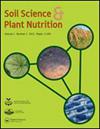Nitrous oxide and carbon dioxide emissions from two soils amended with different manure composts in aerobic incubation tests
IF 1.8
4区 农林科学
Q3 ENVIRONMENTAL SCIENCES
引用次数: 2
Abstract
ABSTRACT Identification of nitrous oxide (N2O) and carbon dioxide (CO2) emissions from soils amended with different types of compost is needed for appropriate use of manure in agriculture. This study aimed at investigating the interaction effects of compost type and soil properties and effects of moisture contents on N2O and CO2 emissions, with identification of relative abundances of functional ammonia-oxidizing genes. Laboratory tests were conducted using cattle manure compost (CC) or mixed compost (MC) (cattle, poultry, and swine manure) amended Kochi (from a greenhouse) or Ushimado (from a paddy field) soils (3% by weight) with controls (no compost). Initial moisture contents were adjusted to 60% water-holding capacity (WHC) for Kochi soil and 70% WHC for both soils. The samples were aerobically incubated at 25°C. Emissions of N2O and CO2 and contents of ammonium N (NH4 +-N) and nitrate N in soils were measured continuously until day 42. The abundances of ammonia-oxidizing bacteria (AOB) and archaea genes were estimated to evaluate nitrifying activities. Cumulative N2O and CO2 emissions were significantly higher (p < 0.05) in MC than those in CC treatments probably due to higher NH4 +-N content and lower C/N ratio, which facilitated faster N mineralization and C decomposition. Emissions of N2O and CO2 were higher in compost-amended Kochi soil (70% WHC) with high total C and N, mineral N, and clay contents than those in less fertile Ushimado soil. Interestingly, interactions of compost type and soil properties on N2O emissions were significant (p < 0.05) only in Kochi soil because the addition of decomposition resistant CC increased N2O emissions only from this soil with high C and N contents. Higher soil moisture contents increased N2O and CO2 emissions significantly (p < 0.05) in Kochi soil. Emissions of N2O until day 15 were mainly due to activities of AOB amoA genes (R2 = 0.91). This study suggests that N2O emissions are increased by high NH4 +-N contents and a low C/N ratio in compost and high total C and N, mineral N, and clay contents in soil. The application of compost with less decomposable C increases N2O emissions only from nutrient-rich soil.在有氧培养试验中,两种土壤经不同粪肥堆肥改良后的氧化亚氮和二氧化碳排放
摘要鉴定不同类型堆肥改良土壤的氧化亚氮(N2O)和二氧化碳(CO2)排放是农业肥料合理利用的必要条件。本研究旨在探讨堆肥类型与土壤性质的交互作用以及水分含量对N2O和CO2排放的影响,并确定功能性氨氧化基因的相对丰度。实验室试验使用牛粪堆肥(CC)或混合堆肥(MC)(牛、家禽和猪粪)与对照(不添加堆肥)一起,对Kochi(来自温室)或ushima(来自稻田)土壤(按重量计3%)进行改良。高知土壤初始含水量调整为持水能力的60%,两种土壤的持水能力调整为70%。样品在25°C有氧孵育。连续测定土壤中N2O和CO2的排放量以及铵态氮(NH4 +-N)和硝态氮的含量,直至第42天。测定了氨氧化菌(AOB)和古细菌基因的丰度,评价了硝化活性。MC处理的累积N2O和CO2排放量显著高于CC处理(p < 0.05),这可能是由于MC处理的NH4 +-N含量较高,C/N比值较低,有利于N矿化和C分解。高知土壤(70% WHC)改良后总碳氮、矿质氮和粘土含量较高,N2O和CO2的排放量高于土岛岛土壤。有趣的是,堆肥类型和土壤性质对N2O排放的交互作用仅在高知土壤中显著(p < 0.05),因为添加抗分解CC只增加了高C和N含量土壤的N2O排放。土壤含水量的增加显著提高了高知土壤N2O和CO2的排放(p < 0.05)。第15天前的N2O排放主要受AOB amoA基因活性的影响(R2 = 0.91)。研究表明,堆肥中较高的NH4 +-N含量和较低的C/N比以及土壤中较高的总碳氮、矿质氮和粘土含量增加了N2O排放。施用可分解碳较少的堆肥只会增加养分丰富的土壤中N2O的排放。
本文章由计算机程序翻译,如有差异,请以英文原文为准。
求助全文
约1分钟内获得全文
求助全文
来源期刊

Soil Science and Plant Nutrition
农林科学-农艺学
CiteScore
4.80
自引率
15.00%
发文量
56
审稿时长
18-36 weeks
期刊介绍:
Soil Science and Plant Nutrition is the official English journal of the Japanese Society of Soil Science and Plant Nutrition (JSSSPN), and publishes original research and reviews in soil physics, chemistry and mineralogy; soil biology; plant nutrition; soil genesis, classification and survey; soil fertility; fertilizers and soil amendments; environment; socio cultural soil science. The Journal publishes full length papers, short papers, and reviews.
 求助内容:
求助内容: 应助结果提醒方式:
应助结果提醒方式:


